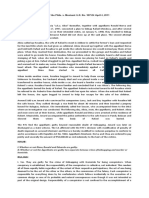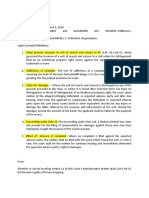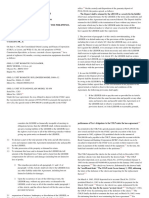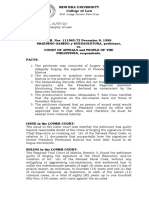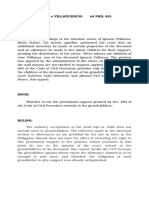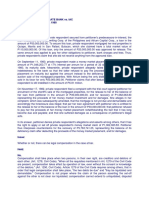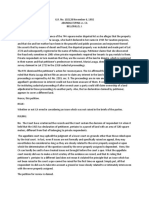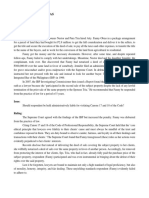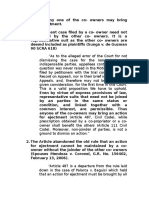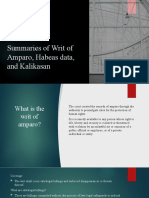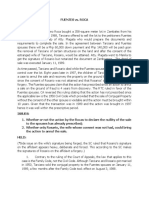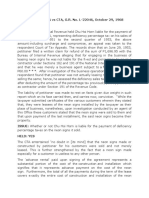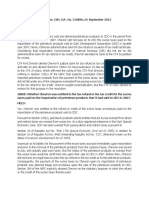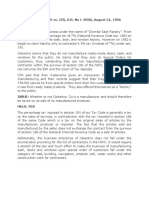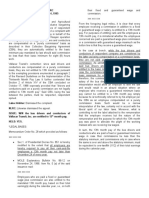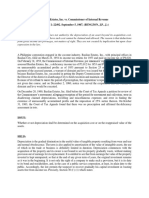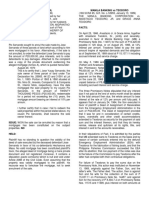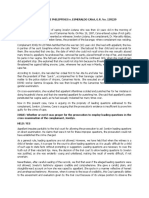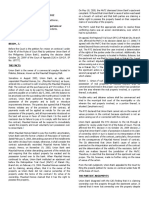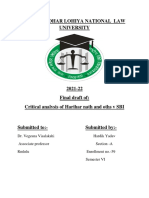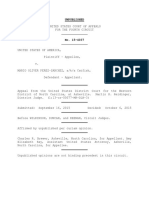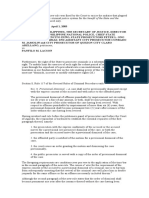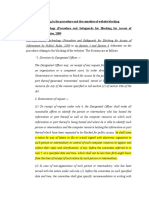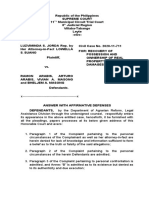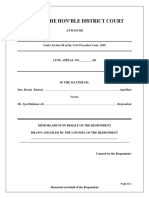Ricarze Vs CA
Ricarze Vs CA
Uploaded by
Kim Lorenzo CalatravaCopyright:
Available Formats
Ricarze Vs CA
Ricarze Vs CA
Uploaded by
Kim Lorenzo CalatravaOriginal Description:
Original Title
Copyright
Available Formats
Share this document
Did you find this document useful?
Is this content inappropriate?
Copyright:
Available Formats
Ricarze Vs CA
Ricarze Vs CA
Uploaded by
Kim Lorenzo CalatravaCopyright:
Available Formats
RICARZE vs. C.
A
FACTS: Petitioner Eduardo G. Ricarze was a collector-messenger assigned at the main office of
Caltex. His primary task was to collect checks payable to the company and deliver them to the
cashier. He also delivered invoices to Caltexs customers.
On November 6, 1997, Caltex, through its Banking and Insurance Department Manager filed a
criminal complaint against petitioner for estafa through falsification of commercial documents,
alleging that, while the company was conducting a daily electronic report from Philippine
Commercial & Industrial Bank (PCIB), one of its depositary banks, it was discovered that unknown to
the department, a company check, had been cleared through PCIB. An investigation also revealed
that two other checks were also missing and that in a check, the department managers signature and
that of another signatory, were forgeries. Another check was also cleared through the same bank
which was likewise not issued by Caltex, and the signatures appearing thereon had also been forged.
In the meantime, the PCIB credited the amount of P500K to Caltex on March 29, 1998.
However, the City Prosecutor of Makati City was not informed of this development.
Twin information were filed alleging the intent to defraud or cause damage to Caltex.
During the pre-trial, the Siguion Reyna, Montecillio and Ongsiako Law Offices (SRMO) as
private prosecutor representing PCIB filed a Formal Offer of Evidence. Petitioner contends that SRMO
had no personality to appear as private prosecutor because under the Information, the private
complainant is Caltex and not PCIB.
PCIB, through SRMO, opposed the motion. It contended that the PCIB had re-credited the
amount to Caltex to the extent of the indemnity; hence, the PCIB had been subrogated to the rights
and interests of Caltex as private complainant.
Petitioner next argues that in no way was PCIB subrogated to the rights of Caltex, considering
that he has no knowledge of the subrogation much less gave his consent to it.
ISSUE: W/N PCIB was subrogated to the rights of Caltex.
RULING: Petitioners argument on subrogation is misplaced. The Court agrees with respondent
PCIBs comment that petitioner failed to make a distinction between legal and conventional
subrogation.
Subrogation is the transfer of all the rights of the creditor to a third person, who substitutes
him in all his rights. It may either be legal or conventional.
Legal subrogation is that which takes place without agreement but by operation of law
because of certain acts. Instances of legal subrogation are those provided in Article 1302 of the Civil
Code.
Conventional subrogation, on the other hand, is that which takes place by agreement of the
parties.
Thus, petitioners acquiescence is not necessary for subrogation to take place because the
instant case is one of legal subrogation that occurs by operation of law, and without need of the
debtors knowledge.
You might also like
- Kamaya Point Hotel Vs NLRCDocument1 pageKamaya Point Hotel Vs NLRCKim Lorenzo CalatravaNo ratings yet
- Bible Baptist Church V CADocument2 pagesBible Baptist Church V CAJuvial Guevarra BostonNo ratings yet
- 46 Estate of Ong Vs DiazDocument2 pages46 Estate of Ong Vs DiazLeica JaymeNo ratings yet
- Batulanon vs. PeopleDocument3 pagesBatulanon vs. PeopleMichelle Montenegro - AraujoNo ratings yet
- People of The Phils. v. Montanir G.R. No. 187534 April 4, 2011Document3 pagesPeople of The Phils. v. Montanir G.R. No. 187534 April 4, 2011Jerry CaneNo ratings yet
- LOPEZ Vs PeopleDocument5 pagesLOPEZ Vs PeopleAnonymous oDPxEkdNo ratings yet
- Del Rosario v. DonatoDocument3 pagesDel Rosario v. Donatojdg jdgNo ratings yet
- Midterm Cases EvidenceDocument309 pagesMidterm Cases EvidenceAiai Harder - GustiloNo ratings yet
- Law 107 - Tan Cong V StewartDocument2 pagesLaw 107 - Tan Cong V StewartDanielle AbuelNo ratings yet
- Chavez V. CADocument2 pagesChavez V. CAadeeNo ratings yet
- Dela Cuesta V SandiganbayanDocument9 pagesDela Cuesta V SandiganbayanBrian Tomas0% (1)
- People V SopeDocument1 pagePeople V SopeMaria AIthea MicIat TevesNo ratings yet
- People vs. Domasian G.R. No. 95322Document4 pagesPeople vs. Domasian G.R. No. 95322strgrlNo ratings yet
- Lups-Abscbn Vs CADocument3 pagesLups-Abscbn Vs CAAllenNo ratings yet
- San Luis vs. San Luis G.R. No. 133743, February 6, 2007Document2 pagesSan Luis vs. San Luis G.R. No. 133743, February 6, 2007Sui GenerisNo ratings yet
- 14) People of The Philippines v. QueDocument1 page14) People of The Philippines v. QueDaniela Sandra AgootNo ratings yet
- 28 Ortega Vs Leonardo 103 Phil 870 1958Document4 pages28 Ortega Vs Leonardo 103 Phil 870 1958Rhei BarbaNo ratings yet
- Third Division G.R. No. 190834, November 26, 2014 ARIEL T. LIM, Petitioner, v. PEOPLE OF THE PHILIPPINES, Respondent. Decision Peralta, J.Document10 pagesThird Division G.R. No. 190834, November 26, 2014 ARIEL T. LIM, Petitioner, v. PEOPLE OF THE PHILIPPINES, Respondent. Decision Peralta, J.Nowell Anne BrizuelaNo ratings yet
- David Vs Senate Electoral TribunalDocument4 pagesDavid Vs Senate Electoral TribunalKhalid PundogarNo ratings yet
- 37 - Dujon v. Ampatuan, GR No. 188707 (Tan)Document2 pages37 - Dujon v. Ampatuan, GR No. 188707 (Tan)Nica Cielo B. LibunaoNo ratings yet
- UPDATEDDocument7 pagesUPDATEDLeeyoNo ratings yet
- Second Division: Willy G. Sia, Appellee, vs. People of The Philippines, AppellantDocument12 pagesSecond Division: Willy G. Sia, Appellee, vs. People of The Philippines, AppellantLianne Rose ParajenoNo ratings yet
- Mary Rose Vote VS Prosec Villena Et AlDocument3 pagesMary Rose Vote VS Prosec Villena Et Alkristian datinguinooNo ratings yet
- Riodique That "Only After The Appellate Court Holds in A Final Judgment That A Trial Judge's Alleged ErrorsDocument3 pagesRiodique That "Only After The Appellate Court Holds in A Final Judgment That A Trial Judge's Alleged ErrorsJennica Gyrl G. DelfinNo ratings yet
- Case Digest - Kimberly Labor Union V NLRCDocument2 pagesCase Digest - Kimberly Labor Union V NLRCMarion Nerisse KhoNo ratings yet
- 11 People Vs Obsania 23 Scra 1249Document18 pages11 People Vs Obsania 23 Scra 1249LalaLanibaNo ratings yet
- Crimes Against Personal Liberty and Security CompiledDocument17 pagesCrimes Against Personal Liberty and Security CompiledJayson VicedoNo ratings yet
- JULIAN YAP Vs SANTIAGO TANADADocument2 pagesJULIAN YAP Vs SANTIAGO TANADAGale Charm SeñerezNo ratings yet
- Gamido vs. Court of Appeals, 251 SCRA 101Document2 pagesGamido vs. Court of Appeals, 251 SCRA 101Alvin D. ConstantinoNo ratings yet
- Alvarez V. Cfi - Case Digest - Constitutional LawDocument2 pagesAlvarez V. Cfi - Case Digest - Constitutional LawCedrickNo ratings yet
- Ong Vs GenioDocument1 pageOng Vs GenioDiane JulianNo ratings yet
- RENATO ALVARO RUPERTO VsDocument2 pagesRENATO ALVARO RUPERTO Vstink echivereNo ratings yet
- Valeroso vs. Court of Appeals FactsDocument6 pagesValeroso vs. Court of Appeals FactsKimberly RamosNo ratings yet
- ALFREDO RODILLAS Y BONDOC v. THE HONORABLE SANDIGANBAYAN and THE PEOPLE OF THE PHILIPPINESDocument1 pageALFREDO RODILLAS Y BONDOC v. THE HONORABLE SANDIGANBAYAN and THE PEOPLE OF THE PHILIPPINESGSSNo ratings yet
- Antone V BeronillaDocument11 pagesAntone V BeronillaArgel Joseph CosmeNo ratings yet
- G.R. No. 175949 Fact DigestDocument1 pageG.R. No. 175949 Fact DigestMary Dee100% (1)
- Enervida vs. de La TorreDocument2 pagesEnervida vs. de La TorreEr BurgosNo ratings yet
- Bautista v. Court of Appeals20190210-5466-1hgkqjuDocument12 pagesBautista v. Court of Appeals20190210-5466-1hgkqjuAmmie AsturiasNo ratings yet
- Gelig vs. PeopleDocument2 pagesGelig vs. Peoplemei atienzaNo ratings yet
- Babao V Villavicencio 44 Phil 921Document1 pageBabao V Villavicencio 44 Phil 921SFar AbasNo ratings yet
- PP V FieldadDocument1 pagePP V FieldadMichael Ang SauzaNo ratings yet
- International Corporate Bank vs. IACDocument2 pagesInternational Corporate Bank vs. IACJaysonNo ratings yet
- US V ZieglerDocument3 pagesUS V ZieglerAgee Romero-ValdesNo ratings yet
- Tayag Vs LacsonDocument23 pagesTayag Vs LacsonGladys BantilanNo ratings yet
- 35 Ilusorio vs. BildnerDocument1 page35 Ilusorio vs. BildnerNathan Michael VasquezNo ratings yet
- Espina Vs CADocument1 pageEspina Vs CAKFNo ratings yet
- TRIA-SAMONTE vs. OBIASDocument1 pageTRIA-SAMONTE vs. OBIASAshley CandiceNo ratings yet
- Cases in EjecmentDocument6 pagesCases in EjecmentNarciso Reyes Jr.No ratings yet
- FT Campos Grefiel Cabangcala 117-118Document2 pagesFT Campos Grefiel Cabangcala 117-118marielkuaNo ratings yet
- Case Digest - Roberto G. Famanila v. CADocument2 pagesCase Digest - Roberto G. Famanila v. CAVince AbacanNo ratings yet
- Rescissible Contracts - Cabaliw V Sadorra (1975)Document1 pageRescissible Contracts - Cabaliw V Sadorra (1975)Lino MomonganNo ratings yet
- Vda. de Delgado vs. CADocument8 pagesVda. de Delgado vs. CAhuhah303No ratings yet
- Case - Roldan v. MadronaDocument3 pagesCase - Roldan v. MadronaAnonymous gzsN1pQRNo ratings yet
- #1 People vs. Judith PonceDocument2 pages#1 People vs. Judith PonceBernadette Pedro100% (1)
- Summaries of Writ of Amparo, Habeas Data, and KalikasanDocument15 pagesSummaries of Writ of Amparo, Habeas Data, and KalikasanPhillip Joshua GonzalesNo ratings yet
- Pamil Vs TeleronDocument2 pagesPamil Vs TeleronRuab PlosNo ratings yet
- People Vs LimDocument1 pagePeople Vs LimAdriann Juanir CastañedaNo ratings yet
- Ricarze Vs CADocument2 pagesRicarze Vs CANicole IbayNo ratings yet
- Ricarze v. CA 515 S302Document2 pagesRicarze v. CA 515 S302lil userNo ratings yet
- Pinote Vs AycoDocument5 pagesPinote Vs AycoWalter FernandezNo ratings yet
- Eduardo G. Ricarze vs. CA and People of The Philippines, Caltex PH, Inc. and PCI BankDocument2 pagesEduardo G. Ricarze vs. CA and People of The Philippines, Caltex PH, Inc. and PCI BankTricia SibalNo ratings yet
- Fuentes Vs RocaDocument2 pagesFuentes Vs RocaKim Lorenzo CalatravaNo ratings yet
- Government of Hongkong Vs OlaliaDocument2 pagesGovernment of Hongkong Vs OlaliaKim Lorenzo CalatravaNo ratings yet
- CHU HOI HORN Vs CTADocument2 pagesCHU HOI HORN Vs CTAKim Lorenzo CalatravaNo ratings yet
- CIR Vs Tokyo ShippingDocument2 pagesCIR Vs Tokyo ShippingKim Lorenzo Calatrava100% (1)
- Philex Mining Vs CirDocument2 pagesPhilex Mining Vs CirKim Lorenzo CalatravaNo ratings yet
- Chevron Vs CIRDocument2 pagesChevron Vs CIRKim Lorenzo CalatravaNo ratings yet
- Heirs of Fernandez Vs MingoaDocument2 pagesHeirs of Fernandez Vs MingoaKim Lorenzo CalatravaNo ratings yet
- CBK Power Vs CirDocument3 pagesCBK Power Vs CirKim Lorenzo CalatravaNo ratings yet
- Victorias Milling Vs CtaDocument1 pageVictorias Milling Vs CtaKim Lorenzo CalatravaNo ratings yet
- Celestino Co Vs Collector of Internal RevenueDocument1 pageCelestino Co Vs Collector of Internal RevenueKim Lorenzo CalatravaNo ratings yet
- Reyes Vs AlmanzorDocument2 pagesReyes Vs AlmanzorKim Lorenzo CalatravaNo ratings yet
- Reyes Vs YsipDocument1 pageReyes Vs YsipKim Lorenzo CalatravaNo ratings yet
- Paciwu Vs NLRCDocument1 pagePaciwu Vs NLRCKim Lorenzo CalatravaNo ratings yet
- Basilan Estates Vs CIRDocument2 pagesBasilan Estates Vs CIRKim Lorenzo Calatrava100% (1)
- In The Matter of Administration of The Estate of Tan Po PicDocument1 pageIn The Matter of Administration of The Estate of Tan Po PicKim Lorenzo CalatravaNo ratings yet
- Credit Transactions DigestsDocument4 pagesCredit Transactions DigestsKim Lorenzo CalatravaNo ratings yet
- Cuizon Vs RamoleteDocument1 pageCuizon Vs RamoleteKim Lorenzo Calatrava100% (1)
- Aboitiz Shipping Vs Dela SernaDocument1 pageAboitiz Shipping Vs Dela SernaKim Lorenzo CalatravaNo ratings yet
- Integrated Packaging Corp Vs CADocument1 pageIntegrated Packaging Corp Vs CAKim Lorenzo CalatravaNo ratings yet
- People Vs CanaDocument2 pagesPeople Vs CanaKim Lorenzo CalatravaNo ratings yet
- Macias Vs Uy KimDocument1 pageMacias Vs Uy KimKim Lorenzo CalatravaNo ratings yet
- Valera Vs OfiladaDocument2 pagesValera Vs OfiladaKim Lorenzo CalatravaNo ratings yet
- Republic Vs CaguioaDocument6 pagesRepublic Vs CaguioaKim Lorenzo CalatravaNo ratings yet
- Jumamil Vs CafeDocument1 pageJumamil Vs CafeKim Lorenzo CalatravaNo ratings yet
- Commissioner of Internal Revenue Vs Isabela Cultural CorporationDocument2 pagesCommissioner of Internal Revenue Vs Isabela Cultural CorporationKim Lorenzo Calatrava100% (6)
- Cir Vs Tours SpecialistDocument1 pageCir Vs Tours SpecialistKim Lorenzo CalatravaNo ratings yet
- Fernandez Hermanos Vs CirDocument2 pagesFernandez Hermanos Vs CirKim Lorenzo CalatravaNo ratings yet
- Barcenas Vs TomasDocument1 pageBarcenas Vs TomasKim Lorenzo CalatravaNo ratings yet
- Union Bank Vs Maunlad HomesDocument4 pagesUnion Bank Vs Maunlad HomesKim Lorenzo CalatravaNo ratings yet
- 13-10-03 Government Motion To Stay Microsoft Lawsuit Over Ban EnforcementDocument3 pages13-10-03 Government Motion To Stay Microsoft Lawsuit Over Ban EnforcementFlorian MuellerNo ratings yet
- Company Law ProjectDocument8 pagesCompany Law ProjectHardik YadavNo ratings yet
- United States v. Mario Perez-Sanchez, 4th Cir. (2015)Document5 pagesUnited States v. Mario Perez-Sanchez, 4th Cir. (2015)Scribd Government DocsNo ratings yet
- Employment Contracts in IndiaDocument24 pagesEmployment Contracts in IndiaAshwini PrabhakaranNo ratings yet
- Time Bar JuRisDocument2 pagesTime Bar JuRisIlanieMalinisNo ratings yet
- Website Blocking IssueDocument6 pagesWebsite Blocking IssueDivya PandeyNo ratings yet
- Dispute - Regarding Navigational and Related Rights ICJDocument2 pagesDispute - Regarding Navigational and Related Rights ICJNelson Fabián ReyesNo ratings yet
- 2ND DEFENDANT'S COUNTER AFFIDAVIT IN OPPOSITION TO THE PLAINTIFFS' MOTION ON NOTICE FOR INTERLOCUTORY INJUNCTION FILED ON 6th JUNE, 20224Document21 pages2ND DEFENDANT'S COUNTER AFFIDAVIT IN OPPOSITION TO THE PLAINTIFFS' MOTION ON NOTICE FOR INTERLOCUTORY INJUNCTION FILED ON 6th JUNE, 20224asaladeji14No ratings yet
- ANSWER COMPLAINT (jordaVSarabis)Document9 pagesANSWER COMPLAINT (jordaVSarabis)Finch AtticusNo ratings yet
- Case 11-20Document20 pagesCase 11-20balbasjuliusNo ratings yet
- Professional Regulation Commission (PRC) - LuceroDocument9 pagesProfessional Regulation Commission (PRC) - LuceroMelrick LuceroNo ratings yet
- Republic of The Philippines National Capital Judicial Region Regional Trial Court BRANCH - City of ManilaDocument3 pagesRepublic of The Philippines National Capital Judicial Region Regional Trial Court BRANCH - City of ManilazaneNo ratings yet
- Booking Report 9-2-2020Document2 pagesBooking Report 9-2-2020WCTV Digital Team100% (1)
- Alabama Motion To DismissDocument12 pagesAlabama Motion To DismissHelen TanseyNo ratings yet
- Loan and Security AgreementDocument51 pagesLoan and Security Agreementbefaj44984100% (1)
- Pakistan Stock Exchange LimitedDocument6 pagesPakistan Stock Exchange LimitedNaimat Ullah MuhammadNo ratings yet
- Jub' Il Bin Mohamed Taib Taral & Ors V Sunway Lagoon SDDocument21 pagesJub' Il Bin Mohamed Taib Taral & Ors V Sunway Lagoon SDnroshaNo ratings yet
- 3-2021-51109 - Certificate of Registration (New Law New Rules) - B-2022-43740Document5 pages3-2021-51109 - Certificate of Registration (New Law New Rules) - B-2022-43740JimBeeNo ratings yet
- Pat Jones LawsuitDocument8 pagesPat Jones LawsuitKING 5 NewsNo ratings yet
- De Borja v. de Borja, 46 SCRA 577Document8 pagesDe Borja v. de Borja, 46 SCRA 577randelrocks2No ratings yet
- Rhino Foods Draft AgreementDocument9 pagesRhino Foods Draft AgreementUtkarsh KhandelwalNo ratings yet
- Act 167 Plant Quarantine Act 1976Document21 pagesAct 167 Plant Quarantine Act 1976Adam Haida & CoNo ratings yet
- 10 Kinds of ObligationDocument7 pages10 Kinds of ObligationAzalea AragonNo ratings yet
- CJC111 Chapter 9 Key TermsDocument2 pagesCJC111 Chapter 9 Key Termskaylyn.bryan0827No ratings yet
- Minneapolis Police Unannounced Entry Search Warrants - New PolicyDocument2 pagesMinneapolis Police Unannounced Entry Search Warrants - New PolicyPatch MinnesotaNo ratings yet
- C.P.C MemorialDocument18 pagesC.P.C MemorialprinceNo ratings yet
- Carlyle Investment Management v. Moonmouth Company SA, 3rd Cir. (2015)Document15 pagesCarlyle Investment Management v. Moonmouth Company SA, 3rd Cir. (2015)Scribd Government DocsNo ratings yet
- Criminal Law 2 - Ra 10951: (Date)Document16 pagesCriminal Law 2 - Ra 10951: (Date)Dyan LazoNo ratings yet
- People v. DacanayDocument2 pagesPeople v. DacanayVian O.100% (1)
- Macapagal-Arroyo v. People of The PhilippinesDocument2 pagesMacapagal-Arroyo v. People of The PhilippinesJhoel Villafuerte100% (1)




